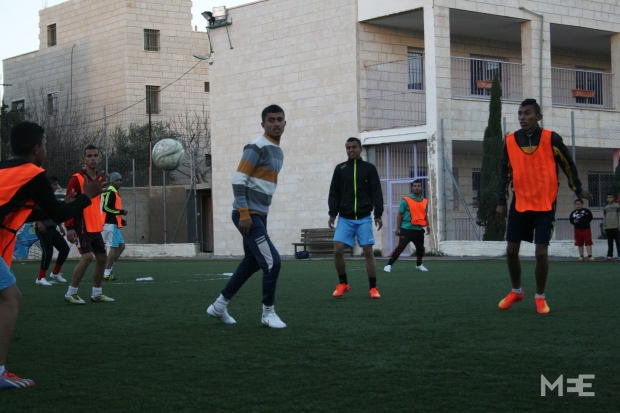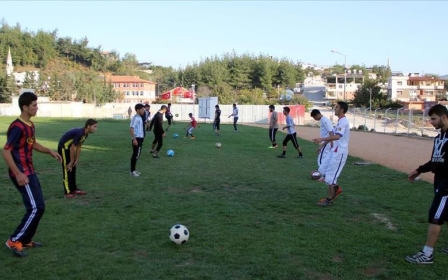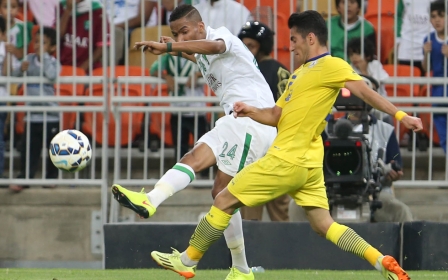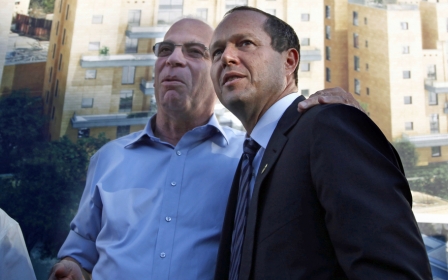The Desert Hawks: Bedouin football team plays against all odds
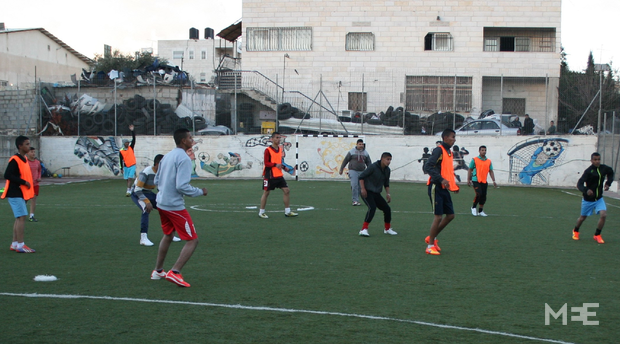
Every Saturday evening in the Palestinian municipality of Beit Sahour, floodlights illuminate a field of dreams.
For a team of young football hopefuls named the Desert Hawks, neither extreme weather nor Israeli oppression has deterred them from travelling across occupied Palestine to play their beloved game. Despite a battle for their very existence, and obstacles most of us only dream about, the 17-strong Jahalin Bedouin team have never missed a training session.
Palestinian tour guide Yamen Elabed runs alternative tours in the West Bank. When taking groups to Jericho, the 37-year-old meets them near Maale Adumim, the third-largest Israeli settlement in Palestine. The extravagantly landscaped city of 40,000 people has been dubbed the settlement that killed the two-state solution, and sits at the heart of the Israeli government’s E1 project.
The controversial construction plan seeks to link Maale Adumim and Jerusalem by a corridor of settlements, enclosed by the separation wall. Further development in this main artery between the northern and southern West Bank will eradicate any remaining Palestinian territorial contiguity.
Before setting off, Elabed’s tours are able to see the settlement up close while he explains how Israeli expansionism is physically and psychologically devastating local Bedouin communities. Participants are introduced to the village of Khan al-Ahmar where 250 people eke out a daily existence a stone’s throw from the opulence of Maale Adumim, with no running water, electricity or healthcare.
'We don’t want computers, we want to play football'
After leading a semi-nomadic life for hundreds of years in the Negev desert, the Jahalin Bedouin tribe became refugees following the establishment of the state of Israel in 1948. The largest of the exiled tribes in the West Bank today, the Jahalin have maintained a struggle for their basic human rights on the Jerusalem periphery for over 60 years.
When one of Elabed’s groups asked to visit Khan al-Ahmar two years ago, it was a day that was to change everything. After spending three hours with the Bedouin families, one participant was so moved that she wanted to do more to help.
After glimpsing the camp’s solar panels - later confiscated by Israel - the Jewish American made the generous offer of providing computers for the families. Elabed told the Jahalin about the offer and smiled as he recounted their reaction. “Here’s the best bit … they said, ‘We don’t want computers, we want to play football!'”
The tour guide knew he had to get creative in finding ways for the team to play. If a pitch was built at the camp, it would only be a matter of time before settlers or the Israeli authorities destroyed it, so he set about organising transport, a coach and regular training.
Some of the kids had played football sporadically for years but a series of false promises by individuals and organisations left them with mixed feelings about the new venture.
Elabed was also anxious at taking on the responsibility until Jane Lewis, the team’s sponsor reassured him. “She said she would keep supporting them as long as she lives - even she had to work extra hours or knock on doors for money,” he said adding that the long-term activist who is deeply committed to her relationship with Palestine continues to bear sole responsibility for fund-raising for the team.
Once reassured by the sponsor, Elabed sent for players from the five Jahalin camps. Laughing, he described what happened next: “Two buses carrying 40 kids showed up! I thought, you’ve got to be kidding me!” he exclaimed.
After narrowing the team down to the best 20 players, he bought boots for those that didn’t make the cut and sent them off to practise. The new team began training and the Desert Hawks were born.
After three months they were ready to compete, so Elabed made some calls and arranged their first match. By summer 2015, they had played three tournaments and had come in fifth in the Bethlehem Ramadan Cup. When hosting a Ugandan tour group, Elabed noticed that some were wearing football shirts and it gave him an idea.
“I said it would be great if you came to play my team,” he said. “They were students and had no money, so I sent transport and bought medallions and cups. It was a great day and even better because the Desert Hawks beat them 5–3!”
Aware expenses would increase as the team became more successful, Elabed was prepared. “I really care about them. The occupation is destroying them more and more. Hopefully one day they will be stars and play an Israeli team, who knows?”
'I wait for Saturday to come'
Tall and slim, 17-year-old Ronaldo fan Mohammed is the team’s most promising player. Originally a member of the Jericho youth team, he is still at school and dreams of playing professionally. “The Desert Hawks is something really good, it is a dream for us. We still can’t believe we have a team and it works so well,” he said.
“I wait for Saturday to come so I can play.”
Mohammed practises his new skills after school three times a week, despite the pressure and dehumanisation from Israeli settlers. “We are steadfast,” he said.
“I thought I was retired and would never play football again,” said accomplished sportsman Mohammed, 40, the team coach. After joining his first club at 14, he went on to play for one of Bethlehem’s top teams and is a three-time winner of the Palestine marathon.
“When I met him last year, he looked older than he does now,” said the tour guide, Yamen, and both men laughed. “Now he looks young.”
Full of admiration for the team, Mohammed said he can see himself in the players. Describing a vast improvement in their abilities since the beginning, he said they would play every day if they could. He wants to see them playing a tournament per month this year. “At first, they weren’t communicating with each other, now they play as a family, a proper team,” he said.
Adamant that the Israeli occupation affects all sport in Palestine, Mohammed said you don’t have to go far to see the difference for those who can move freely.
“Look at Jordan, their teams play in Europe and other countries. They get better and better and get salaries. In Palestine, they work and play football in the evenings and are tired at the end of the day. We all come from work to the field,” he said.
Asked if the Desert Hawks face different challenges to other Palestinian teams, Mohammed smiled and described how the guys were amazed to play on grass instead of dirt. “They also couldn’t believe the lights,” he laughed. “In the desert they must go home when it is dark, here we can play late because of the lights.”
He said they take the game seriously and he does too. “I feel I am dealing with men ... I can make stars of them but it will take a while.”
He added: “They have brought something good in my life, this is like a dream for me too.”
We want to be like everyone else
“We want to be like everyone else,” said Real Madrid supporter Ahmed. “Smart, educated people. We are Bedouin but we want the same opportunities others have.”
After playing for fun since the age of six, the 16-year-old is thrilled to have the opportunity to play organised football and wants to play against the Palestinian national team one day. His dream is to be a professional player and a lawyer as he wants to defend his people from occupation. “Why can’t I do both?” he asked, smiling.
“They (Israel) want to destroy our school and put a lot of pressure on us. They come at night when we are asleep and wake us up. They try to make us miserable so we leave.”
Asked what he would tell the world about Palestine, Ahmed was frank. “For people who don’t know about the Bedouin, or Palestine, I would like to say that we are peaceful, educated people. We want the world to look at the Palestinian case, not just the Bedouin. We want justice for all of Palestine.”
Middle East Eye propose une couverture et une analyse indépendantes et incomparables du Moyen-Orient, de l’Afrique du Nord et d’autres régions du monde. Pour en savoir plus sur la reprise de ce contenu et les frais qui s’appliquent, veuillez remplir ce formulaire [en anglais]. Pour en savoir plus sur MEE, cliquez ici [en anglais].


